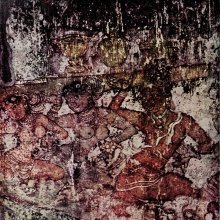Mahallika, Mahallikā: 6 definitions
Introduction:
Mahallika means something in Hinduism, Sanskrit, Buddhism, Pali. If you want to know the exact meaning, history, etymology or English translation of this term then check out the descriptions on this page. Add your comment or reference to a book if you want to contribute to this summary article.
Images (photo gallery)
In Hinduism
Kavya (poetry)
Source: Wisdom Library: KathāsaritsāgaraMahallikā (महल्लिका) is the daughter of Prahlāda, according to the Kathāsaritsāgara, chapter 45. Accordingly: “... on that occasion Sūryaprabha beheld the daughter of Prahlāda, named Mahallikā, who came forward to dance, by order of her father. She illuminated the world with her beauty, rained nectar into his eyes, and seemed like the moon-goddess come to the underworld out of curiosity. She had her forehead ornamented with a patch, beautiful anklets on her feet, and a smiling face, and seemed as if all made of dancing by the Creator. With her curling hair, her pointed teeth, and her breasts that filled up the whole of her chest, she seemed, as it were, to be creating a new style of dance”.
Also, “... then the prince divided his body by his magic science, and lived at the same time with all those Asura ladies, but with his real body he lived principally with his best beloved, Mahallikā, the daughter of the Asura Prahlāda”.
The story of Mahallikā was narrated by the Vidyādhara king Vajraprabha to prince Naravāhanadatta in order to relate how “Sūryaprabha, being a man, obtain of old time the sovereignty over the Vidyādharas”.
The Kathāsaritsāgara (‘ocean of streams of story’), mentioning Mahallikā, is a famous Sanskrit epic story revolving around prince Naravāhanadatta and his quest to become the emperor of the vidyādharas (celestial beings). The work is said to have been an adaptation of Guṇāḍhya’s Bṛhatkathā consisting of 100,000 verses, which in turn is part of a larger work containing 700,000 verses.

Kavya (काव्य, kavya) refers to Sanskrit poetry, a popular ancient Indian tradition of literature. There have been many Sanskrit poets over the ages, hailing from ancient India and beyond. This topic includes mahakavya, or ‘epic poetry’ and natya, or ‘dramatic poetry’.
Languages of India and abroad
Pali-English dictionary
Source: BuddhaSasana: Concise Pali-English Dictionarymahallikā : (f.) old woman.

Pali is the language of the Tipiṭaka, which is the sacred canon of Theravāda Buddhism and contains much of the Buddha’s speech. Closeley related to Sanskrit, both languages are used interchangeably between religions.
Sanskrit dictionary
Source: DDSA: The practical Sanskrit-English dictionaryMahallika (महल्लिक).—A eunuch in a king's harem (a word derived from Arabic); मुष्कशून्योऽनुपस्थो यः स्त्रीस्वभावो महल्लिकः (muṣkaśūnyo'nupastho yaḥ strīsvabhāvo mahallikaḥ) Śabdamālā.
Derivable forms: mahallikaḥ (महल्लिकः).
See also (synonyms): mahalla.
Source: Cologne Digital Sanskrit Dictionaries: Monier-Williams Sanskrit-English Dictionary1) Mahallikā (महल्लिका):—[from mahallaka > mahalla] f. a female attendant in the women’s apartments, [cf. Lexicographers, esp. such as amarasiṃha, halāyudha, hemacandra, etc.]
2) [v.s. ...] Name of a daughter of Prahlāda, [Kathāsaritsāgara]
3) Mahallika (महल्लिक):—[from mahalla] m. = mahalla, [cf. Lexicographers, esp. such as amarasiṃha, halāyudha, hemacandra, etc.]
[Sanskrit to German]
Sanskrit, also spelled संस्कृतम् (saṃskṛtam), is an ancient language of India commonly seen as the grandmother of the Indo-European language family (even English!). Closely allied with Prakrit and Pali, Sanskrit is more exhaustive in both grammar and terms and has the most extensive collection of literature in the world, greatly surpassing its sister-languages Greek and Latin.
See also (Relevant definitions)
Full-text: Mahallaka, Mahalla, Mahelika, Anjanika, Malini, Mandaramala, Pivara, Kesharavali, Kalindi, Kesini, Ujjvala, Kamala, Bhadraka, Sairandhra, Saudamini, Amritaprabha.
Relevant text
Search found 4 books and stories containing Mahallika, Mahallikā; (plurals include: Mahallikas, Mahallikās). You can also click to the full overview containing English textual excerpts. Below are direct links for the most relevant articles:
Kathasaritsagara (the Ocean of Story) (by Somadeva)
Chapter XLV < [Book VIII - Sūryaprabha]
Some Frescoes of the Cholas < [November-December 1933]
Vinaya Pitaka (3): Khandhaka (by I. B. Horner)
On one who had formerly been a member of another sect < [1. Going forth (Pabbajjā)]
The Mahavastu (great story) (by J. J. Jones)
Chapter IV - Mañjarī-jātaka < [Volume II]
Chapter XXIII - The story of Rāhula < [Volume III]
